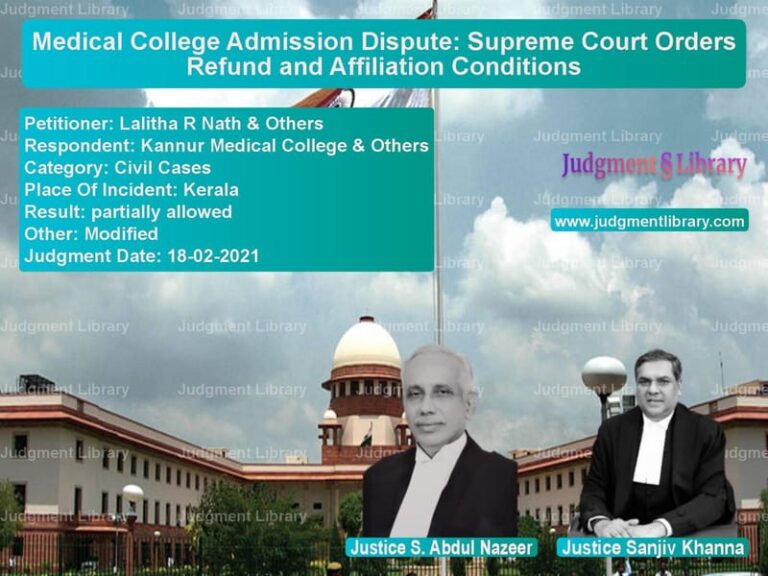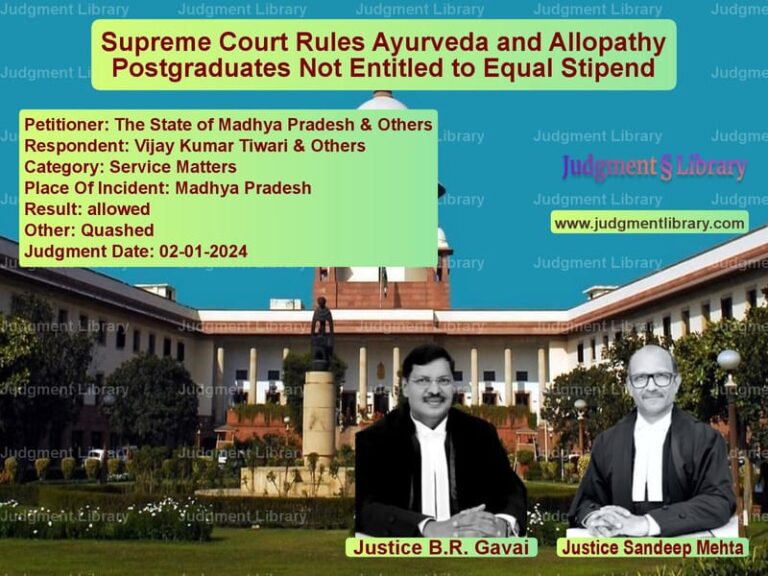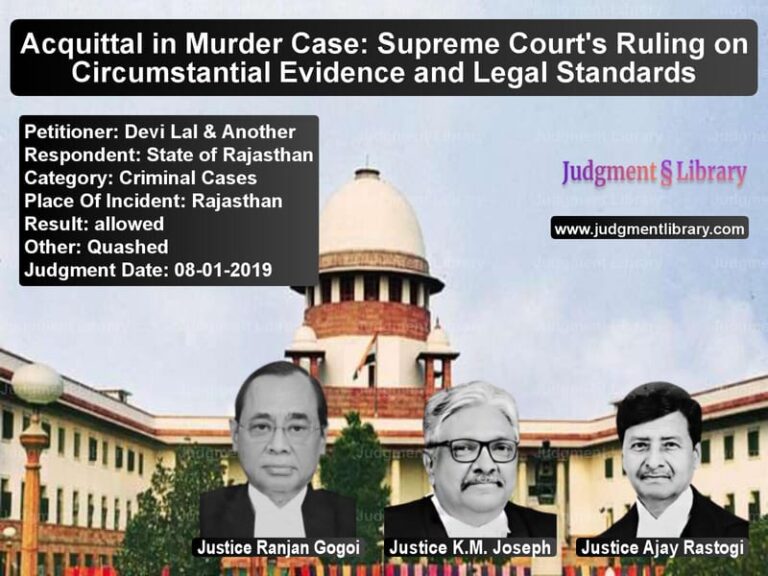Rajasthan Murder Case: Supreme Court Acquits Accused Due to Lack of Evidence
The case of State of Rajasthan vs. Mahesh Kumar @ Mahesh Dhaulpuria & Anr. is a landmark ruling concerning circumstantial evidence in criminal trials. The Supreme Court upheld the acquittal of the accused, emphasizing that a conviction cannot be based on a weak chain of evidence. The ruling reaffirmed that in cases relying on circumstantial evidence, the prosecution must establish an unbroken chain leading to the accused’s guilt beyond reasonable doubt.
The case revolved around the murder of Bajranglal, a retired constable, whose body was found near a railway line in Kota, Rajasthan. The prosecution alleged that the accused had murdered him and placed his body on the railway tracks to make it look like an accident. However, both the trial court and the Rajasthan High Court found the evidence inadequate to convict the accused. The Supreme Court dismissed the prosecution’s appeal and upheld the acquittal.
Background of the Case
The key events leading to the case are as follows:
- On October 19, 2002, a dead body was discovered near the railway line in Kota, Rajasthan.
- The body was identified as that of Bajranglal, a retired constable.
- A written report was filed by Abdul Haq, informing the police about the presence of the body.
- The police registered an FIR under Sections 302 (murder) and 201 (causing disappearance of evidence) read with Section 34 of the Indian Penal Code (IPC).
- The accused, Mahesh Kumar, Deendayal, and Devkaran, were arrested and charged with murder.
- The trial court convicted the accused based on circumstantial evidence.
- On appeal, the Rajasthan High Court overturned the conviction, citing inconsistencies and lack of direct evidence.
- The prosecution appealed to the Supreme Court to reinstate the conviction.
Prosecution’s Arguments
The State of Rajasthan, represented by legal counsel, made the following arguments:
- The accused had a motive for the crime, as Bajranglal allegedly had disputes with them.
- Multiple witnesses testified that they saw the accused near the scene of the crime.
- The accused transported the body in an auto-rickshaw and placed it on the railway tracks to mislead the investigation.
- The circumstantial evidence, though not direct, was sufficient to establish guilt beyond reasonable doubt.
Defense’s Arguments
The defense, representing Mahesh Kumar and others, countered with the following points:
- There was no direct evidence linking the accused to the murder.
- Most of the prosecution witnesses had turned hostile and retracted their statements.
- The forensic evidence did not conclusively establish that the body was transported in the accused’s vehicle.
- The alleged motive was weak and did not establish intent beyond reasonable doubt.
- The investigation was flawed, and key witnesses were not examined by the prosecution.
Supreme Court’s Observations
The Supreme Court bench, comprising Indira Banerjee and Ajay Rastogi, made the following key observations:
- The prosecution failed to establish a complete chain of circumstantial evidence.
- The High Court was correct in finding the circumstantial evidence unreliable.
- There was no forensic proof that the accused had transported the body.
- The failure to examine key witnesses weakened the prosecution’s case.
- A conviction in a case based on circumstantial evidence must exclude all possible hypotheses other than the guilt of the accused.
Critical Judgment Excerpt: “The chain of circumstantial evidence produced by the prosecution is very doubtful, contradictory, and not reliable at all. Most of the prosecution witnesses were declared hostile, and many important and relevant witnesses were not produced without any reason.”
Final Decision
The Supreme Court dismissed the prosecution’s appeal and upheld the High Court’s acquittal:
- The evidence presented was not sufficient to convict the accused beyond reasonable doubt.
- Hostile witnesses and lack of direct evidence weakened the prosecution’s case.
- The High Court’s decision was based on well-established legal principles.
- The accused were released from all charges.
Implications of the Judgment
This ruling has significant implications for criminal trials based on circumstantial evidence:
- Reaffirms the principle that circumstantial evidence must be conclusive and complete.
- Ensures that convictions are not based on weak or incomplete evidence.
- Emphasizes the importance of thorough investigation and credible witness testimony.
- Prevents wrongful convictions based on conjecture or incomplete chains of evidence.
Legal Precedents and Framework
The Supreme Court’s ruling aligns with established legal principles governing circumstantial evidence. Key precedents include:
- Sharad Birdhichand Sarda vs. State of Maharashtra (1984) – Established the five essential conditions for proving a case based on circumstantial evidence.
- State of U.P. vs. Ashok Kumar Srivastava (1992) – Held that the chain of evidence must lead to only one conclusion: the guilt of the accused.
- Chandmal vs. State of Rajasthan (1976) – Clarified that suspicion, no matter how strong, cannot take the place of proof.
Conclusion
The Supreme Court’s decision in State of Rajasthan vs. Mahesh Kumar ensures that the fundamental principles of criminal justice are upheld. By dismissing the prosecution’s appeal, the Court reaffirmed the necessity of strong and conclusive evidence in cases based on circumstantial evidence. This ruling serves as an important precedent in ensuring that convictions are based on irrefutable proof, thereby protecting the rights of the accused and maintaining the integrity of the justice system.
Petitioner Name: State of Rajasthan.Respondent Name: Mahesh Kumar @ Mahesh Dhaulpuria & Anr..Judgment By: Justice Indira Banerjee, Justice Ajay Rastogi.Place Of Incident: Kota, Rajasthan.Judgment Date: 16-07-2019.
Don’t miss out on the full details! Download the complete judgment in PDF format below and gain valuable insights instantly!
Download Judgment: State of Rajasthan vs Mahesh Kumar @ Mahes Supreme Court of India Judgment Dated 16-07-2019.pdf
Direct Downlaod Judgment: Direct downlaod this Judgment
See all petitions in Murder Cases
See all petitions in Judgment by Indira Banerjee
See all petitions in Judgment by Ajay Rastogi
See all petitions in dismissed
See all petitions in supreme court of India judgments July 2019
See all petitions in 2019 judgments
See all posts in Criminal Cases Category
See all allowed petitions in Criminal Cases Category
See all Dismissed petitions in Criminal Cases Category
See all partially allowed petitions in Criminal Cases Category







